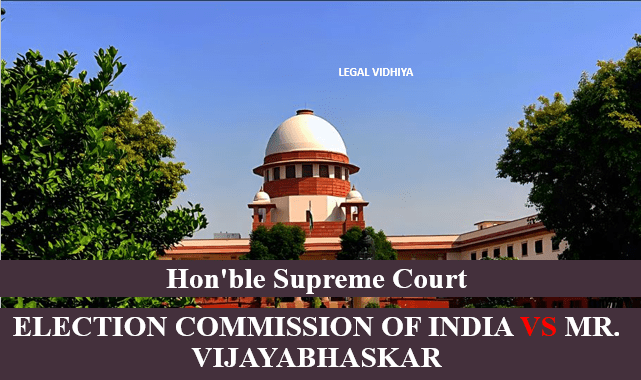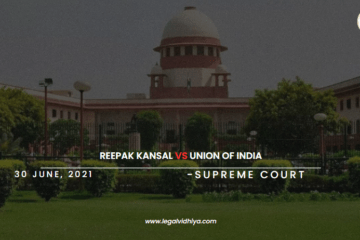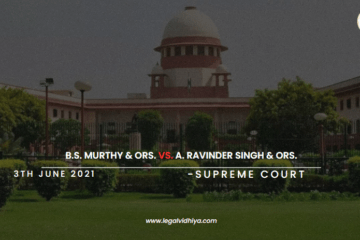
| Citation | SLP (C) No. 6731 of 2021 |
| Date of Judgement | 06th May, 2021 |
| Court | Supreme Court Of India |
| Case Type | Civil |
| Appellant | The Chief Election Commission of India |
| Respondent | Mr. Vijayabhaskar |
| Bench | Justice D.Y Chandrachud, Justice M.R Shah |
| Referred | Article 19(1)(A)- Guarantees Freedom of Speech & Expression. |
FACTS OF THE CASE
In the case discussed, Mr. Vijayabhaskar, a candidate of the All India Anna Dravida Munnetra Kazhagam from the Karur Legislative Assembly, filed a writ in the Madras High Court to make sure that COVID safe protocols were being followed in the process of polling in Karur Legislative Assembly Constituency of Tamil Nadu under the Article 226 of the Indian Constitution.
Due to a surge in the number of COVID-19 cases, the respondent sent a representative on 16th April 2021 to ensure proper measures and precautions were being adopted to ensure the safety of the officers in the counting booths. Due to no response being received by the respondent, the respondent filed a writ petition in the Madras High Court, asking the court to provide a direction to ensure fair counting of votes at the 135-Karur Legislative Assembly constituency by adopting effective steps according to the COVID-19 protocols on 2nd of May 2021.
The petition was heard by a Division Bench of the High Court, comprising Justice Sanjib Banerjee, Chief Justice of the Madras High Court, and Justice Senthilkumar Ramamoorthy, on 26 April 2021, where the court recognized that the Election Commission failed to ensure proper COVID-19 appropriate norms either at the time of campaigning of the political parties and that social distancing was not observed, causing a surge of cases. It ordered the Election Commission of India, to adopt COVID-19-appropriate methods and ensure proper sanitation and hygienic conditions to protect the health of officials at the time of counting.
However, during the hearing, it is alleged that the High Court orally observed that the Election Commission should be held singularly responsible for the second wave of COVID-19 and therefore should be put up for murder charges. These observations and comments find no mention in the order dated 26th April 2021, were however printed, and reported in the media. This in turn, led to a complaint which was filed by an individual on 27th April 2021 against Mr. Sudip Jain, Deputy Election Commissioner, and other officials of the Election Commission under Sections 269, 270, and 340 read with Section 120-B of the Indian Penal Code, 1860 in Khardah Police Station, Kolkata. The said complaint made no reference to the order dated 26th April 2021 of the Madras High Court.
This made the Election Commission file a special leave petition before the Supreme Court of India after their miscellaneous application was not properly assessed by the Madras High Court based on the merits and regarding the oral observation and remarks of the Madras High Court.
ISSUE
- Should the media be restrained from reporting oral marks and observations made during the judicial proceeding?
ARGUMENTS
Contentions of the Appellant– The High Court should not have made any discouraging remarks or oral observations that the Election Commission is singularly responsible for the second wave of COVID-19 and that it should be put up for murder charges, as such charges tarnish the image of the Election Commission and disrupt the faith of the people within the Election Commission. The judiciary has limited control over the Election Commission in matters of conduct of elections and the court should practice restraint while making observations about the electoral process. The Appellant also argued that the actual enforcement of protocols and safety measures falls under the governance of the State and not the Election Commission and that the elections were not a significant factor in a surge of cases, and States where no elections were held such as Maharashtra, Delhi, and Karnataka did witness several surges in cases and passing such remarks tarnishes the image of the Election Commission and exceeds the boundaries of judicial propriety. It also argued the urgency of directions and guidelines for the media on the manner of reporting court proceedings. The media should make sure that they accurately report court proceedings and proceedings must not be sensationalized, as this would lead to a loss of public confidence, therefore a balance should be maintained between the conduct of court proceedings and the freedom of media.
Contentions of the Respondent- The Respondent argued that the Election Commission enjoys a wide variety of powers in the State during the time of election – it can deploy paramilitary forces, suspend or replace officers such as District magistrates, police officers and even the Director General of Police, to ensure that their directives are followed. Hence, the Election Commission was responsible for the implementation of safety measures and COVID-19 appropriate protocols during the elections.
JUDGEMENT
The Supreme Court of India observed that the oral remarks made during the entire judicial process were never mentioned as the component of the judgment given. The court recognized that the comments made by Madras High Court were wrong. It was accepted that while passing such serious comments, the appointment judges should control themselves, especially in open courts as it can harm the reputation of any of the parties and the language utilized by the appointed judges while mentioning the facts of the case, orally must respect both the parties legally.
The Supreme Court dismissed the prayer of the Election Commission to restrict the media from revealing any oral comments made by any of the judicial authorities within or outside the court as it harbingers many rights of the media mentioned in the Indian Constitution. The Court stressed the idea of providing data of the case, with respect to legal procedures of the case, should be open to everyone and the people in general and it should be made accessible to the public as public scrutiny fosters confidence in the process and public discussion works as a restraint on the conduct of a judge. The Court held that public scrutiny is important to maintain transparency and accountability which establishes the public’s faith in the judicial system and is, therefore, a vital principle for the functioning of democracy.
It stressed that it cannot direct or provide any guidelines when it comes to reporting cases. This reduces the accountability of the Court and the Judicial system, keeping democracy at its core. It took various references from cases of print media during the British Raj to make the Election Commission understand that they or any constitutional authorities should accept and acknowledge the new situation and evolve themselves for the same rather than complain.
The Supreme Court of India emphasized the need for proper usage of language by judges, both on the Bench and in judgments, as it can be susceptible to misinterpretation. It also pointed out that any oral remarks made which are not a part of the judgment have no question of expunging as it does not reflect the formal opinion of a judicial institution. It further commends the response shown by the High Courts, across the country, in managing the public health crisis during COVID-19.
REFERENCES
https://indiankanoon.org/doc/188051462/
This Article is written by Divya Kapoor of Lloyd Law College, Intern at Legal Vidhiya.
Disclaimer: The materials provided herein are intended solely for informational purposes. Accessing or using the site or the materials does not establish an attorney-client relationship. The information presented on this site is not to be construed as legal or professional advice, and it should not be relied upon for such purposes or used as a substitute for advice from a licensed attorney in your state. Additionally, the viewpoint presented by the author is of a personal nature.

![COMMISSIONER OF INCOME TAX-I vs. M/s RELIANCE ENERGY LTD. (FORMERLY BSES LTD.) THROUGH ITS M.D. [APRIL 28, 2021].](https://legalvidhiya.com/wp-content/uploads/2024/10/Screenshot-2024-10-24-194927-360x240.png)


1 Comment
Nishant Kumar Srivastava · November 27, 2023 at 9:33 am
Good article!
Well researched and articulated.
Congratulations Legalvidhiya!